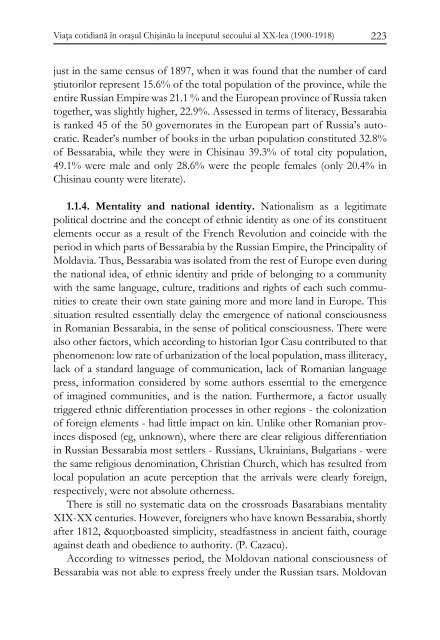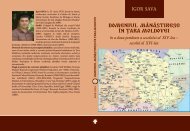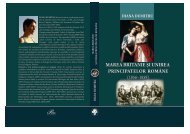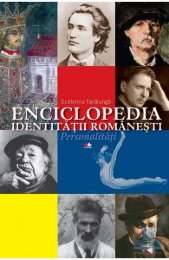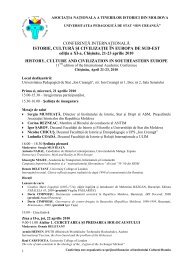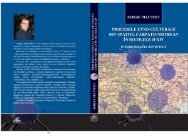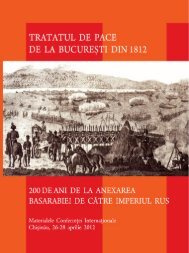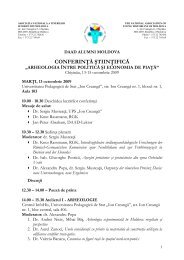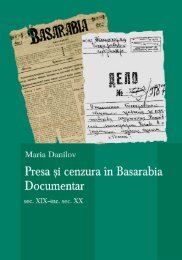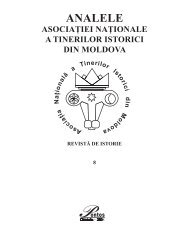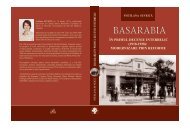LUCIA SAVA, Viaţa cotidiană în oraşul Chişinău la - Asociatia ...
LUCIA SAVA, Viaţa cotidiană în oraşul Chişinău la - Asociatia ...
LUCIA SAVA, Viaţa cotidiană în oraşul Chişinău la - Asociatia ...
Create successful ePaper yourself
Turn your PDF publications into a flip-book with our unique Google optimized e-Paper software.
<strong>Viaţa</strong> <strong>cotidiană</strong> <strong>în</strong> <strong>oraşul</strong> <strong>Chişinău</strong> <strong>la</strong> <strong>în</strong>ceputul secoului al XX-lea (1900-1918)<br />
223<br />
just in the same census of 1897, when it was found that the number of card<br />
ştiutorilor represent 15.6% of the total popu<strong>la</strong>tion of the province, while the<br />
entire Russian Empire was 21.1 % and the European province of Russia taken<br />
together, was slightly higher, 22.9%. Assessed in terms of literacy, Bessarabia<br />
is ranked 45 of the 50 governorates in the European part of Russia’s autocratic.<br />
Reader’s number of books in the urban popu<strong>la</strong>tion constituted 32.8%<br />
of Bessarabia, while they were in Chisinau 39.3% of total city popu<strong>la</strong>tion,<br />
49.1% were male and only 28.6% were the people females (only 20.4% in<br />
Chisinau county were literate).<br />
1.1.4. Mentality and national identity. Nationalism as a legitimate<br />
political doctrine and the concept of ethnic identity as one of its constituent<br />
elements occur as a result of the French Revolution and coincide with the<br />
period in which parts of Bessarabia by the Russian Empire, the Principality of<br />
Moldavia. Thus, Bessarabia was iso<strong>la</strong>ted from the rest of Europe even during<br />
the national idea, of ethnic identity and pride of belonging to a community<br />
with the same <strong>la</strong>nguage, culture, traditions and rights of each such communities<br />
to create their own state gaining more and more <strong>la</strong>nd in Europe. This<br />
situation resulted essentially de<strong>la</strong>y the emergence of national consciousness<br />
in Romanian Bessarabia, in the sense of political consciousness. There were<br />
also other factors, which according to historian Igor Casu contributed to that<br />
phenomenon: low rate of urbanization of the local popu<strong>la</strong>tion, mass illiteracy,<br />
<strong>la</strong>ck of a standard <strong>la</strong>nguage of communication, <strong>la</strong>ck of Romanian <strong>la</strong>nguage<br />
press, information considered by some authors essential to the emergence<br />
of imagined communities, and is the nation. Furthermore, a factor usually<br />
triggered ethnic differentiation processes in other regions - the colonization<br />
of foreign elements - had little impact on kin. Unlike other Romanian provinces<br />
disposed (eg, unknown), where there are clear religious differentiation<br />
in Russian Bessarabia most settlers - Russians, Ukrainians, Bulgarians - were<br />
the same religious denomination, Christian Church, which has resulted from<br />
local popu<strong>la</strong>tion an acute perception that the arrivals were clearly foreign,<br />
respectively, were not absolute otherness.<br />
There is still no systematic data on the crossroads Basarabians mentality<br />
XIX-XX centuries. However, foreigners who have known Bessarabia, shortly<br />
after 1812, "boasted simplicity, steadfastness in ancient faith, courage<br />
against death and obedience to authority. (P. Cazacu).<br />
According to witnesses period, the Moldovan national consciousness of<br />
Bessarabia was not able to express freely under the Russian tsars. Moldovan


